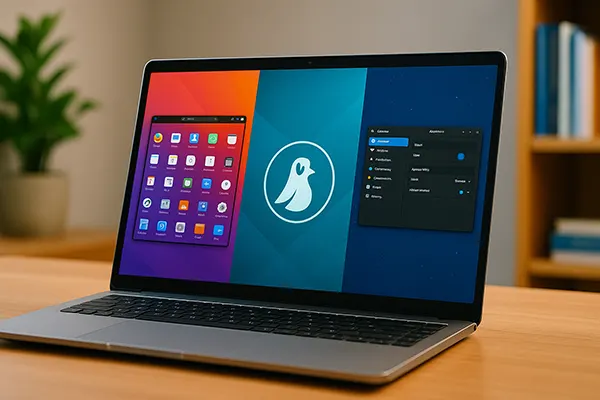
Evolution of Laptops Without Windows: Ubuntu 24.04 LTS, Pop!_OS and Fedora in 2025
The world of personal computing is rapidly evolving as more users and manufacturers explore alternatives to Windows-based laptops. In 2025, Linux distributions such as Ubuntu 24.04 LTS, Pop!_OS, and Fedora are gaining momentum not only among tech enthusiasts but also among average consumers looking for secure, lightweight, and privacy-respecting operating systems. The market has responded with new models that come pre-installed with these operating systems, changing the narrative around what a modern laptop can be.
Ubuntu 24.04 LTS: A Fresh Perspective on Open-Source Computing
Ubuntu 24.04 LTS, released in April 2024, represents a significant leap in usability and stability. As a long-term support version, it will receive updates until 2029, making it a reliable choice for both businesses and individual users. This release has introduced a refined GNOME 46 desktop environment, native support for Wayland sessions, and improved performance across both Intel and AMD hardware platforms.
One of the defining features of Ubuntu 24.04 is its seamless support for Snap and Flatpak applications, which ensures that users can access a wide range of software out-of-the-box without worrying about dependency issues. Enhanced compatibility with hardware like Thunderbolt docking stations and high-DPI screens makes it suitable even for professional creative work.
Security has also seen a boost in this release. The built-in AppArmor module, combined with Secure Boot and automatic kernel updates, makes Ubuntu 24.04 one of the most secure consumer-level Linux distributions currently available. This positions it well against Windows 11 in enterprise and education sectors.
New Laptop Models Shipping with Ubuntu
Manufacturers such as Dell, Lenovo, and Tuxedo Computers are now offering laptops that come with Ubuntu 24.04 pre-installed. Dell’s XPS Developer Edition is a prime example, featuring 13th Gen Intel Core CPUs and optimised firmware support, tested by Canonical engineers. These laptops are now available across Europe and North America.
Lenovo has expanded its ThinkPad lineup to include several models running Ubuntu out-of-the-box. The ThinkPad T14 and X13 now come with fully validated Linux drivers, which were often problematic in the past. These machines target developers, engineers, and researchers who require robust performance and native Linux support.
Meanwhile, boutique vendors like Tuxedo Computers in Germany offer full customisation options with Ubuntu, allowing users to configure everything from RAM to keyboard layouts. This level of flexibility is attractive for both individual users and companies seeking a more controlled environment without the overhead of Windows licensing.
Pop!_OS: Performance-Oriented Linux for Creators and Developers
Pop!_OS, developed by System76, continues to gain traction among developers, engineers, and creators due to its out-of-the-box optimisations and intuitive user interface. The latest release is based on Ubuntu 22.04 LTS, but the team is developing a new COSMIC desktop environment written in Rust, expected to roll out widely in 2025.
What makes Pop!_OS stand out is its dedicated hybrid graphics management, tiling window manager, and workflow-centric design. These features provide better battery performance and speed when working with large datasets, compiling code, or rendering media. The OS is highly modular, allowing power users to customise their experience without compromising system stability.
In addition, System76 laptops offer firmware updates via the LVFS platform, a benefit often missing from many generic Linux laptops. These updates improve compatibility and ensure a consistent user experience as hardware evolves, making Pop!_OS ideal for professionals who need reliability in their daily operations.
System76 and the Push for Linux-First Hardware
System76 remains the primary hardware vendor pushing Linux-first laptops. Their new Galago Pro and Lemur Pro models come with updated Intel and AMD chipsets, NVMe Gen4 SSDs, and 16:10 displays optimised for coding and content creation. The machines are lightweight, powerful, and purpose-built for Linux.
In 2025, System76 has increased its presence in Europe, opening a dedicated distribution centre in the Netherlands to reduce shipping times and improve support for EU customers. This expansion demonstrates growing demand for non-Windows devices tailored for professional work.
The company’s commitment to open firmware, such as Coreboot and open EC firmware, further differentiates it from competitors. These efforts support transparency and contribute to building trust among security-conscious users and organisations.

Fedora 40 and the Red Hat Ecosystem
Fedora 40, backed by Red Hat and the broader open-source community, continues to serve as a cutting-edge Linux distribution with strong innovation and enterprise-level features. The latest version includes GNOME 46, kernel 6.7, and PipeWire improvements for superior audio handling.
This distribution is particularly favoured by developers and IT professionals who need access to the latest packages and development tools. With support for RPM Fusion and Flathub, users can easily install multimedia tools, proprietary drivers, and virtualisation software such as QEMU and libvirt.
Fedora also introduces new SELinux policies and container runtime improvements, making it more aligned with enterprise environments where security and containerisation are crucial. It remains a testing ground for Red Hat Enterprise Linux features before they roll out in the corporate sector.
Laptops with Fedora Out-of-the-Box
HP’s Dev One is a notable laptop that ships with Fedora pre-installed. Launched in collaboration with the Fedora Project, this laptop targets software developers and system administrators. It features Ryzen 7 PRO CPUs, 16 GB RAM, and full Linux compatibility at the firmware level.
Additionally, Slimbook in Spain offers the Fedora Edition of their Executive and Essential laptops. These machines cater to privacy-focused consumers and tech professionals who prefer open-source alternatives. Slimbook provides localised customer service and active support for Fedora users.
The availability of laptops with Fedora is increasing, especially in the education and scientific research sectors, where long-term OS stability, transparency, and adaptability are critical. This trend is expected to grow as more institutions adopt open-source technologies in 2025 and beyond.




